#so maybe it has more to do with whoever just died than with the dham aspect
Text
Alright, I'm assuming for now that the mysterious veiled woman who leaves Dante behind in mémoire 61 is his mother, so place your bets now:
#vnc#vanitas no carte#the case study of vanitas#Dante#Dante vnc#dante my beloved#polls#theory#it looks like she's wearing mourning clothes#so while dham bigotry makes sense given the rest of what we know about Dante and his outlook/life#she clearly kept him for years based on his age there#so maybe it has more to do with whoever just died than with the dham aspect#probably a mix of both imo#or maybe something else entirely
22 notes
·
View notes
Text
The overarching themes of Vanitas no Carte: Identity
The Case Study of Vanitas is a very good, too little known manga (I hope the anime changes something), with some central themes than are exposed in different ways through different characters. In this meta, I want to explore one that was brought to my attention pretty recently: here a little examination on the various ways to face one's own identity in The Case Study of Vanitas.
The Stable Identity( Noè)
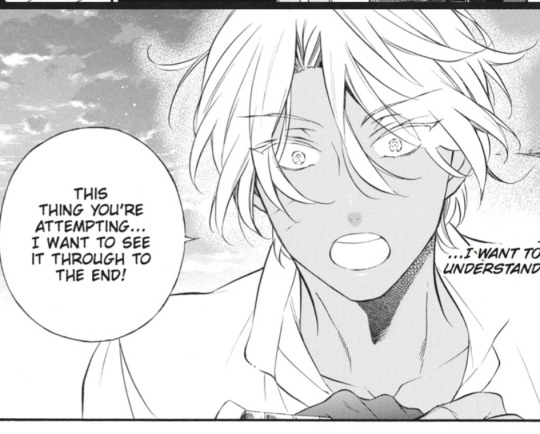
Let's start off with the positives, shall we? Noè has probably the most secure personal identity of all the bunch.
And this is pretty amazing, considering everything he went through. He has no memory of his birth family, but gets adopted by some nice people - who die shortly afterwards. Right at their graves, he is kidnapped by slaves, in an accident that left him injured. Then he is bought by someone who actually treats him nicely and is a good mentor for him, he finds many friends his age - and then one of them, the one he was closest to, turns out to be a cursebearer, kills all of the others and then tries to kill him; he is saved by the mentor, who beheads the friend right in front of him. The most immediate emotion is relief for being alive, and he will always feel terrible for that. Then, he has to witness his surviving friend try to cope very badly with her mourning by repressing her identity and try to substitute it with that of her dead twin. That's a lot.
And Noé reacted to all of this by becoming a confident person, kind and attentive to others, but not to the point of being a pushover. I'm not saying he walked away unscathed from the events of his childhood: he regrets the way he handled things with Louis, the way he didn't understand him, and has developed quite the savior complex as a result.
What I'm saying is that he is probably one of the very few well-adjusted people in the psychiatric ward that is Vanitas no Carte. He is still questioning himself, but in a normal way for a nineteen-years-old that has just left a sheltered environment for the big wide world. He is aware of some of his strenghts (his naivete) and is realizing others (putting unfair expectations on other people, underestimating other people due to racial biases); but most importantly, when he realizes these mistakes, he doesn't run away from them or obsess over them believing they make him a horrible person: he recognizes them, apologizes to the wronged person if necessary, and works on improving them.
This isn't to say he's completely happy-go-lucky with no regrets; he feels guilty about being relieved that he lived while Louis died, and he has a lot of uncertainties regarding his identity as an Archiviste and the impact his powers can have on other people. But he managed not to tie his entire identity to that guilt; and as for the second point, Teacher helped him rationalise that and figure out a conduit that didn't undermine him and at the same time showed respect for others. Noè went through several traumas, but received one thing most of the cast didn't: guidance and support from his environment. Whatever Teacher's actual motives are, he shaped a well-balanced person.
The Group Identity (The dhamps, appearently 99% of vampirekind)
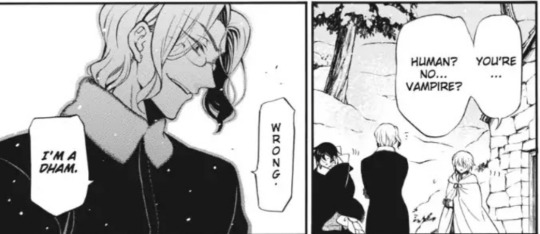
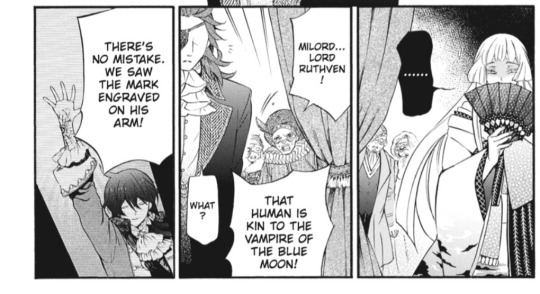
"Us dhams are only loyal to each other!" This is what Dante says in one of the first chapters, giving us the first clues to their status as outcasts.
The war between humans and vampires ended up with each deciding to keep to themselves, but dhampires are the living exception to that silent agreement. So, both societies decide to reject them, and they can't find a place in the world unless they stick to others of their own kind. This common history of traumatic experiences of abandonment and subsequent resentment of both human and vampire society for it goes on to create a very strong group identity: the only ones they give a damn about are those like them, everyone else is a potential enemy and is only good to be exploited.
Then, we have the vampire culture. I mean ... it might be because insofar we have met almost exclusively aristocrats obsessed with their respectability ... but they have a lot of prejudices.
You're born under a uncommon moon? You're a pariah. You're mixed race? You're a pariah. Your parents committed a crime? You're a pariah, and are used as a tool. You're born as part of a set of twins? Either you or your sibling are killed at birth, because of something that is SAID, not even a certified element of vampire biology. You're stuck with a curse? You're executed, no attempts to heal you.
Their society seems to run on an ideal model of person which depends on factors outside the individual's control, and whoever doesn't fit this description and deviates from the group in any shape or form gets ridiculously fierce punishment. They make the freaking Church look good by comparison, at least their repressive and racist side is composed of extremists instead of everymen.
The Clan Identity (Chloé, and partially Noé again)
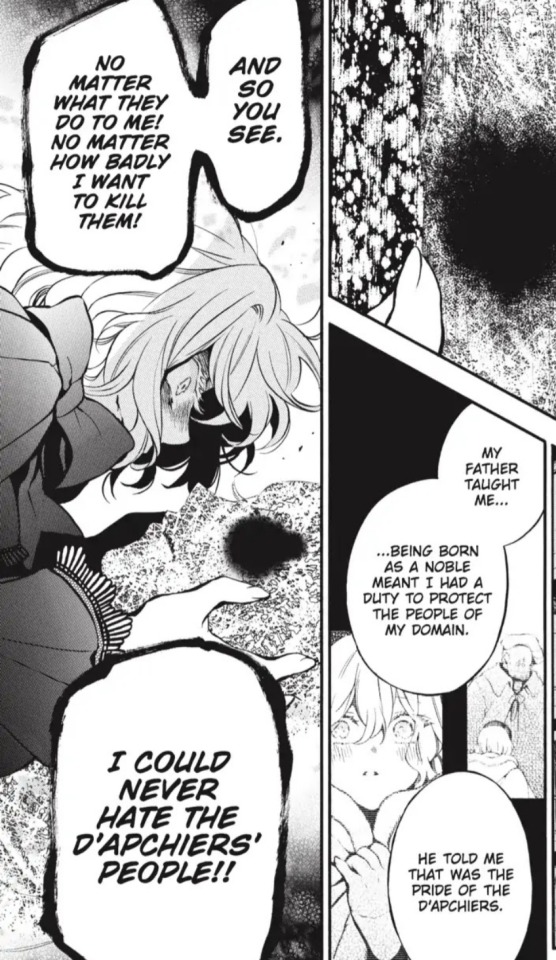
Chloé identifies with a group of people too; but it's not a race, it's a family. The D'Apchier family, the nobles who are responsible for Gevaudan. Her father made sure she had this idea in her right from the start, and she interiorized it.
And this had mixed results: while on the one hand she was chained to self-loathing by the guilt of having accidentally caused the massacre of the family and was only saved by Jeanne and Jean-Jacques reclaiming her as part of theirs, on the other she was able to resist to Naenia because of the love and responsibility she felt towards the people of Gevaudan. Chloé is, at this point, the only curse-bearer who managed to trick and attempted to fight directly against Charlatan.
Then there is Noé in relation to his Archiviste identity. He seems to think of it mainly in negative terms, very conscious of the living invasion of privacy it turns him into ... and nothing else. We have never seen him wonder about who his birth parents were, ask himself why he doesn't remember anything, why was the clan exterminated, or how he feels about being a survivor, one of the only ones if not outright the only. He sees his heritage as a burden,and hasn't thought of it in any different term. I wonder how a change in perspective could impact the above 'stable identity'.
The Someone Else's Identity (Vanitas, Dominique)
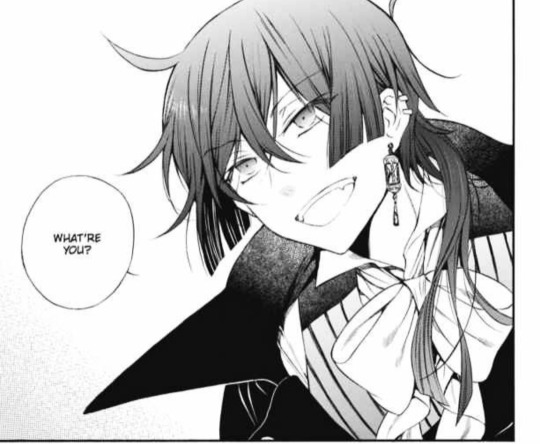
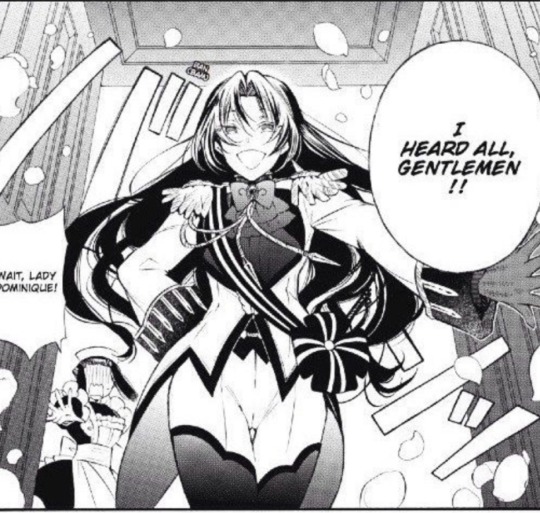
I already dedicated a whole post to this trait they share, so I'll be short: both Vanitas and Dominique hate themselves and try to become something worthy by taking elements of people they admire: Louis for Dominique, a combination of his birth father and Luna for Vanitas.
The Object Identity (Jeanne)
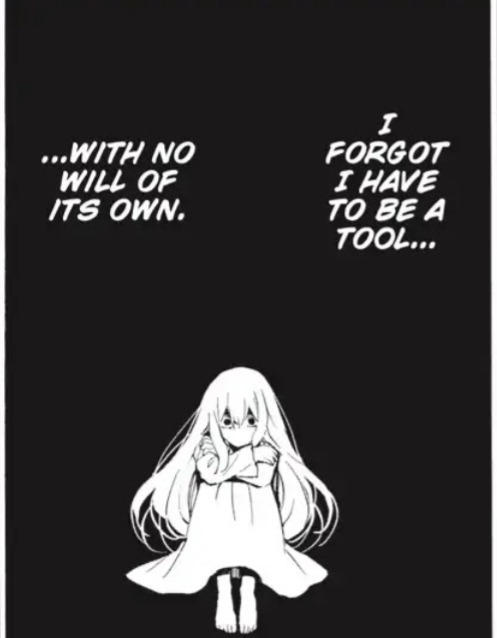
The very first thing Jeanne was said in her whole life was that she was an object. A vessel for something (or someone?) else, who mustn't have feelings or desires of her own. Encouraging, isn't it?
Luckily, this wasn't all she got in life. Soon afterwards, she was adopted by Eric and Louise, who loved her a lot, received kindness by Ruthven, met Chloé who became an older sister to her. Unluckily, all of this was taken away from her in the most cruel way possible.
She couldn't make any sense of her parents's betrayal and death, and the way her life suddenly changed; she rationalised it by telling herself that it was her fault, if she had been just the good object everyone told her to be nothing would have happened. So she accepts the Object Identity: she is a tool, so she doesn't feel, she exists only to obey orders, and as long as she is nobody else will ever suffer. It gets even worse after she fails to kill Chloè: she couldn't fulfill her duties, and both her and her big sis suffered for it. This mindset traps her in a world of pain, but also prevents her from facing the fact that she is subject to a senseless injustice, one she has no control over.
Vanitas managed to help her with that. He validated her feelings, and showed her that nobody had to die if she had them, solving the situation with Chloé and Jean-Jacques. This gave her a nice confidence boost, returning her to the cheerful attitude she had as a young girl; the consequences of this change remain to be seen.
The Unknown Identity (Luna)
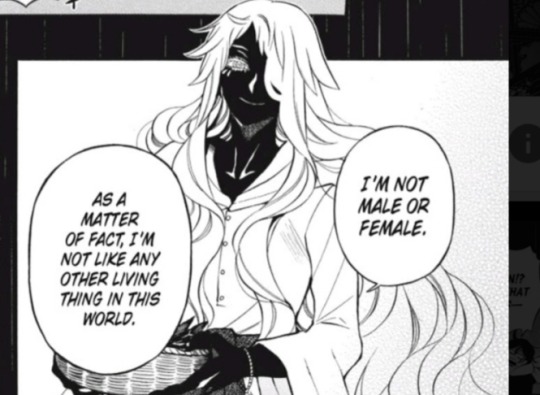
This one is interesting because Luna themselves is pretty explicit about it. They see themselves as something 'other', who is outside commonly used categorization; starting with 'male or female' (and here I am left wondering if they had specific sexual characteristics but didn't feel like they 'fit', or were intersex and nonbinary, or had an entirely different biology from both vampires and humans).
Luna doesn't like this condition: they said they tried to figure out what they were, to understand themselves, and they regret doing so now. Why? Maybe they didn't find any answer and were left perpetually unsatisfied, or they found an answer, and they found it to be awful?
Still, this indicates Luna has never been particularly happy with themselves, and this found no resolution. And then they died. Nice, uh?
Well, I think this was all. There are other characters I would like to know more about in regard to this, like Ruthven, Marquis Machina, and Mikhail, but there is still time.
All in all, I'd say Vanitas no Carte explores the theme of identity pretty throughly; many character arcs are still in progress, and I'm interested about how things will develope especially for Vanitas, Dominique and Jeanne.
Thanks to anyone who bothered to read my ramblings!
#vnc#vanitas no carte#the case study of vanitas#vnc meta#vnc analysis#vnc noe#vnc chloé#vnc vanitas#vnc dominique#vnc jeanne#vnc luna#elia's recaps
263 notes
·
View notes